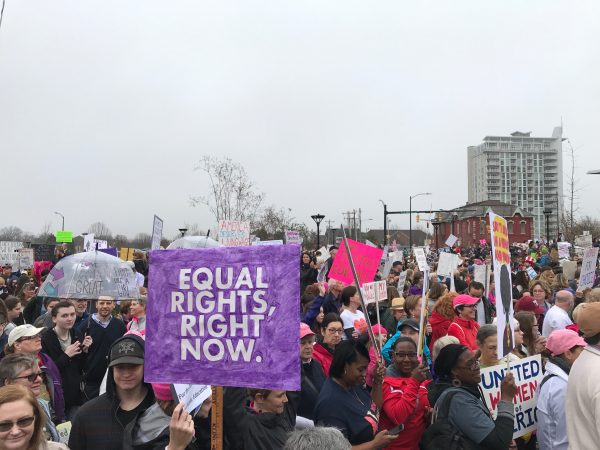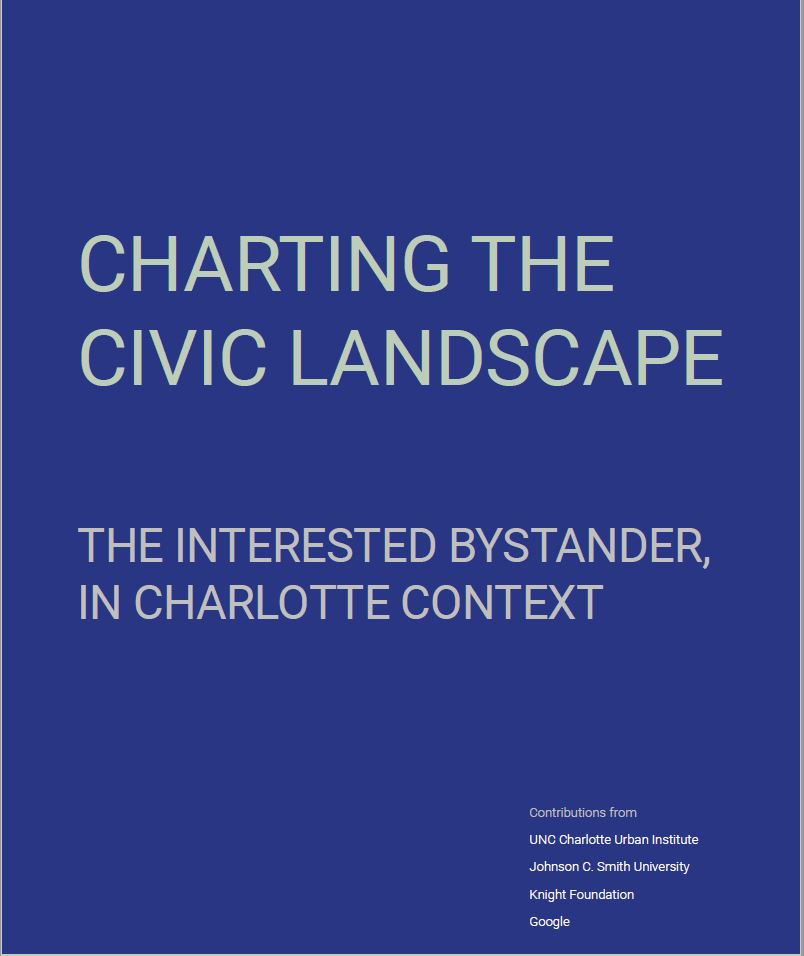Civic Engagement: Reflecting back and looking forward

Charlotte boasts a demographically diverse population, well-educated residents, and a thriving economy. Home to the largest population in the state, the Queen City also serves as the economic epicenter of the state. Nevertheless, our community is paradoxical in many ways, with social, economic, and political barriers that hinder equitable growth, opportunity, and prosperity for those whothat live here.
Despite the array of sports, hospitality, entertainment, and industries that drive the local economy, Charlotte is home to high levels of residential and school segregation that perpetuate a system of uneven distribution of public resources, educational attainment, and economic opportunities. Charlotte holds the dubious distinction of being 50 out of the 50 largest metropolitan areas in terms of intergenerational economic mobility.
Our community has been in conversation for years about how these challenges affect us all.
A less- discussed topic within this conversation is how these challenges influence civic life. From October 2016 through June of 2017, a team from the UNC Charlotte’s Urban Institute and Johnson C. Smith University used a mixed-methods approach to explore how the local landscape influences civic engagement.
Our research built on user research conducted on a national scale by the Google Civic Innovation Team in 2014. In particular, we sought to further the understanding of a population called “Interested Bystanders,” or people who are paying attention to the issues around them, but not acting on those issues.
The full report goes into further detail of our findings, providing a deep dive into different types of interested bystanders. Some of our key findings are below.
Key findings
- Many people in Charlotte are sitting on the sidelines of civic life. 45% of the Charlotte sample were “Interested Bystanders,” paying attention to local issues but not sharing their opinions or getting locally involved.
- Lack of trust is a major barrier to making civic life more meaningful and inclusive. Although the majority of Interested Bystanders described civic engagement as being actively involved and present in one’s community, there was a large distrust of and lack of attachment to local community and government, which deters engagement. This distrust was especially evident among Latino and Black/African American respondents. Interested Bystanders’ lack of attention to local news also likely contributes to their lack of connection to their community.
- Personal passions can be an on-ramp to civic engagement. Having an interest or passion about an issue or activity was the most common motivator for engagement followed by the political environment. Concern for those closest to them emerged as the base of those motivations.
- Leveraging “civic brokers” could reinvigorate Charlotte civic life. Friends and family are the most influential to Interested Bystanders’ civic participation. Social institutions such as religious organizations, schools, businesses are also viewed as influential. The information and encouragement that Interested Bystanders received online from local institutions and organizations allowed them to take their online actions offline.
What’s Next?
The study concluded over a year ago, but many of our findings are relevant today. Despite high midterm turnout, there is considerable room for further and broader engagement. Three findings of note that our community can leverage now: family and friends are highly influential in engagement; opportunities to engage need to be diverse and considerate of different work schedules, capabilities, and personality-types; and people need to understand how their engagement makes a difference.
We also still have a lot of questions. Our study did not have a random sample. As a result, we had more young, female, and white participants than what is representative of the Charlotte population. Our research team used focus groups to diversify the sample and elevate a wide range of community voices. However, a more diverse sample is becoming increasingly more important as Charlotte further diversifies and as trust in surveying and government decreases.
In an attempt to correct for these challenges in future research, the UNC Charlotte Urban Institute, in partnership with researchers from the university’s Ph.D. in Public Policy Program and the Department of Political Science and Public Administration, has developed YourVoiceCLT, a Charlotte community survey panel.
A community survey panel is a method to administer surveys that overcomes obstacles that today’s surveys confront. By creating a large pool of participants, YourVoiceCLT can use statistical methods to provide high-quality opinion data to help inform community decisions.
The initiative will let city and county residents share their thoughts about topics related to their quality of life and/or respond to issues in the news. YourVoiceCLT seeks volunteers to build a participant pool that represents the full range of households and opinions in Charlotte. Anyone 18 or older living in Mecklenburg County is encouraged to join. More information about the survey panel and how to sign up are online at YourVoiceCLT.org.
Diane Gavarkavich is the Director of Research Services at the UNC Charlotte Urban Institute. Charles Thomas is Director/Charlotte for the Knight Foundation. This study was supported by the Knight Foundation and Google.
